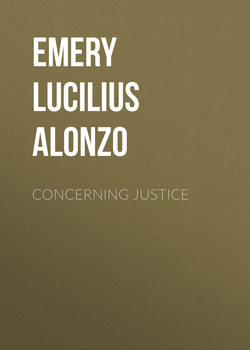Concerning Justice

Реклама. ООО «ЛитРес», ИНН: 7719571260.
Оглавление
Emery Lucilius Alonzo. Concerning Justice
CHAPTER I. THE PROBLEM STATED. THEORIES AS TO THE SOURCE OF JUSTICE. DEFINITIONS OF JUSTICE
CHAPTER II. THE PROBLEM OF RIGHTS. DIFFERENT THEORIES AS TO THE SOURCE OF RIGHTS
CHAPTER III. THE PROBLEM OF RIGHTS CONTINUED. THE NEED OF LIBERTY OF ACTION FOR THE INDIVIDUAL
CHAPTER IV. JUSTICE THE EQUILIBRIUM BETWEEN THE FREEDOM OF THE INDIVIDUAL AND THE SAFETY OF SOCIETY
CHAPTER V. JUSTICE CAN BE SECURED ONLY THROUGH GOVERNMENTAL ACTION. THE BEST FORM OF GOVERNMENT
CHAPTER VI. THE NECESSITY OF CONSTITUTIONAL LIMITATIONS UPON THE POWERS OF THE GOVERNMENT. BILLS OF RIGHTS
CHAPTER VII. THE INTERPRETATION AND ENFORCEMENT OF CONSTITUTIONAL LIMITATIONS NECESSARILY A FUNCTION OF THE JUDICIARY
CHAPTER VIII. AN INDEPENDENT AND IMPARTIAL JUDICIARY ESSENTIAL FOR JUSTICE
CHAPTER IX. THE NECESSITY OF MAINTAINING UNDIMINISHED THE CONSTITUTIONAL LIMITATIONS AND THE POWER OF THE COURTS TO ENFORCE THEM. – CONCLUSION
Отрывок из книги
The problem of Rights is also centuries old. There have been in later years glowing tributes to human rights even more than to justice, though the sentiment of rights is egoistic, while that of justice is in some measure altruistic. There have also been diverse opinions in the past, as now, as to the source, foundation, and nature of what are called Rights, as there were and are of justice. A brief review of these opinions and of the changes in them may present the problem more vividly.
In patriarchal times there could be no political questions about rights. The head of the family was supreme and sole ruler and judge. Even in Rome under an organized civil government the pater familias was long left the power of life and death over the members of his family. When families and tribes were combined in states, government was long conducted on the theory that as the individual had belonged to the family or tribe into which he was born or adopted, so he now belonged to the state, to be directed and disposed of as the state might order. What he might enjoy of life, liberty, or property was the gift of the state, subject to revocation at will. Plato reflects this theory in making Hippias declare that the measure of man's right is what the state commands. The total abolition of the liberty of innocent persons by holding them in slavery was not deemed any infringement of any right of theirs. This theory was acted upon in democratic as well as in monarchical states. Slavery was as lawful in Athens, Sparta, and republican Rome as in Persia or Egypt. True, there were rebellions and revolutions at times, but, though sometimes provoked by oppression, they were usually to acquire the power of government and not in defense of individual rights. The Plebeians revolted to obtain a greater share in the governing power. The civil wars of Marius and Sulla were not waged for liberty but for power. In Sicily, where the slaves under Eunus had for a time wrested the governing power from their masters, they did not hesitate to enslave in turn.
.....
The later disputes as to the proper limits of the power of the British King and Parliament over the American Colonies led the colonial lawyers and politicians to a study of the theory of natural rights advanced by various political writers, English and Continental. It has been said, I think with truth, that the writings of Locke, Voltaire, Rousseau, Montesquieu, and even of Blackstone, were more widely read and studied in America than in Europe. The brilliant writings of Tom Paine also had great influence. The result was that the doctrine of natural rights came to be generally accepted by the people of the Colonies as the real foundation of their claims and the real justification for their resistance to the objectionable acts of the King and Parliament. In 1774 the first Continental Congress in its Declaration of Rights declared that the people of the Colonies had those rights by "the immutable laws of nature" as well as by their charters and the principles of the English Constitution. Two years later in the Declaration of Independence the representatives of the people made no reference to their charters nor to the principles of the English Constitution as the foundation of their claims, but based them exclusively on the theory of natural rights. They declared: "We hold these truths to be self-evident, that all men are created equal; that they are endowed by their Creator with certain unalienable rights; that among these are life, liberty and the pursuit of happiness."
The same influences undoubtedly contributed to bring about the French Revolution of 1789, and the theory of natural rights again found expression in the French state papers of that period. In August of that year, in the early stages of the Revolution, the following "Declaration of the Rights of Man and Citizen" was put forth by the National Assembly and afterwards made the first two articles of the Constitution of 1791, viz., "Art. 1. Men are born and remain free and equal in rights. Social distinctions can be based only upon public utility. Art. 2. The aim of every political association is the preservation of the natural and imprescriptible rights of man. These rights are liberty, property, security and resistance to oppression."
.....